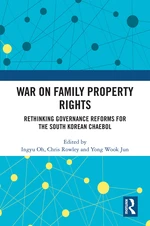As of 2020 South Korea has 14 firms listed on the global Fortune 500, including Samsung, Hyundai, SK, POSCO and LG. The country along with Japan is also one of the only two countries in Asia that are members of the OECD and its Development Assistance Committee (DAC) simultaneously. Furthermore, Korea boasts of its membership in the seven-country 50-30 Club (countries with a population of more than 50 million and a GDP of $30,000 per capita). However, unlike its official status as one of the most developed economies in the world, it still suffers from the backward struggle between the state and the family firms over the issue of property rights and family successions. The corporate governance issue has damaged the reputation of Korean chaebols (family conglomerates) for many decades as founders, and their families had been imprisoned and/or fined for violating inheritance tax laws and related laws associated with the issue of protecting their family ties. The democratically elected governments in Korea since 1987 have tried to reform the chaebol governance structures to ease asset concentration by family members, although many of those have failed due to corruptive practices between the state and the chaebol. This book spells out the current governance problems within the chaebol, state reform policies and both success and failures of the reforms. It was originally published as a special issue of the Asia Pacific Business Review.
Price history
Dec 27, 2022
€56.85

